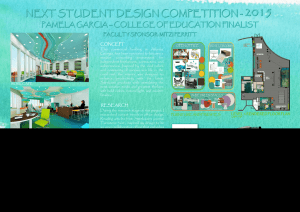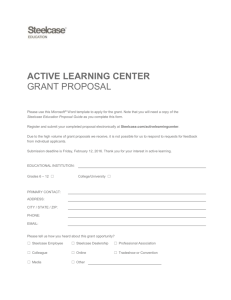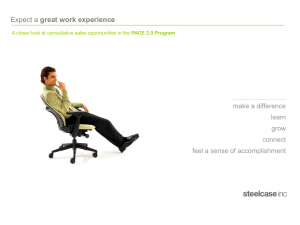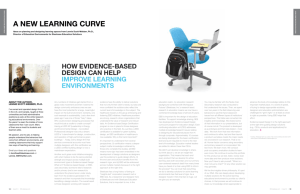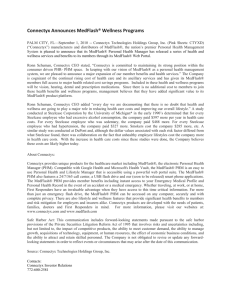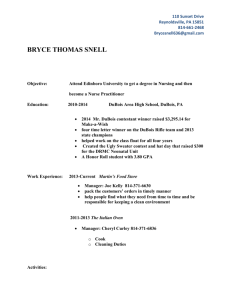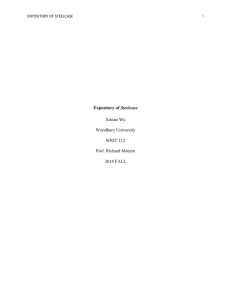A Business Case for the Supply Chain Perspective
advertisement
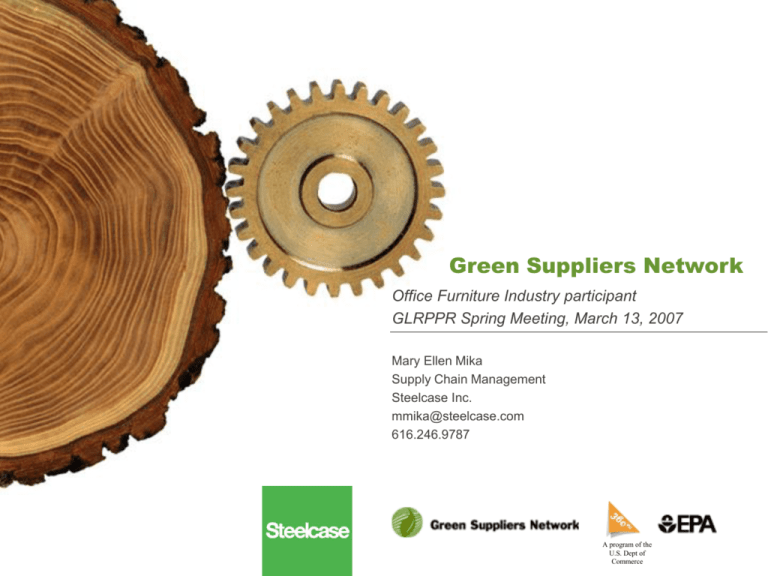
Green Suppliers Network Office Furniture Industry participant GLRPPR Spring Meeting, March 13, 2007 Mary Ellen Mika Supply Chain Management Steelcase Inc. mmika@steelcase.com 616.246.9787 A program of the U.S. Dept of Commerce GSN – Lean and Clean Opportunity We contacted Dubois Johnson-Diversey regarding: Green Suppliers Network & Cost-savings ideas for our paint pretreatment systems. They offered a ‘green CUSTOMER’ solution to address both. 2 A program of the U.S.Dept of Commerce What is the benefit? How does Steelcase benefit? Labor Energy Water Chemical …cost savings and environmental impact reduction. 3 A program of the U.S.Dept of Commerce Great Lakes/Great Plains US EPA Building, 77 Jackson St. Chicago, IL Total Cost of Ownership: a Business Case from the Supply Chain Perspective Case study was conducted in a STEELCASE Systems Plant metal pretreatment washer in Grand Rapids, MI Steelcase Representatives: – MaryEllen Mika – Mike Warners DuBois Representatives: – Keith Lane – Jerry Harrington - P2Conference March 13-14, 2007 Steelcase facts*: • Global Leader – Office Furniture Industry • $2.9 Billion in Global Sales • Mfg. space consolidation (13MM to 5.5MM ft2) • Environmental Leadership • Sustainable growth via “industrial reinvention” • Strong set of Core Values * 2006 Annual Report @ steelcase.com STEELCASE and the Environment: • 2006 Awards and Recognition*: – – – – – – – – – – MBDC’s C2C (cradle to cradle) product certification Only International C2C Certification Gold achievement, WasteWise – 2nd year – prod stewardship Honorable mention, WasteWise – 5th year – waste minimization MVP2 (Most Valuable Pollution Prevention) from NPPR International Innovation Award – Steelcase Canada 2006 Neighborhood Envr. Partners Gold award – by MDEQ Habitat for Humanity – Kent County Donor of the Year award Riverkeeper Annual Benefit Honors – only company so honored Steelcase joins EPA’s Climate Leaders Program – reduce GHG – Just to name a few . . . . . * 2006 Environmental Reports @steelcase.com Facts about DuBois Chemical: • Parent company: S. C. Johnson Racine, WI (retail/distribution) • Operating Divisions of JohnsonDiversey Inc. (Commercial/Ind’l) – H & H, Food & Beverage, BG&E, Industrial • DuBois Chemical- Headquartered in Cincinnati, Ohio – 80 year history of helping customers – ISO 14001 Certified – Markets include: Surface Finishing, Food, Paper, Transportation, other Specialty markets – Applications include: Food C&S, Water & Wastewater treatment, Facilities Maintenance, Lubrication, MWF Fluids, Processing of Metals, Plastics prior to paint, PSB’s etc. Green Suppliers Network: • What is the Green Suppliers Network? – Collaborative venture among industry, US EPA and US Dept of Commerce’s National Institute of Standards and Technology Manufacturing Extension Partnership (NIST MEP). GSN works with large manufacturers to engage their small to medium-sized suppliers in lowcost technical reviews that employ Lean and Clean methodologies to increase productivity, reduce waste, and boost profitability. • What is Lean and Clean? – Lean and Clean expands the traditional definition of Lean (eliminating nonvalue added time, labor and capitol) to one that includes environmental wastes (e.g., reducing energy, water, waste, and emissions). This targets the root causes of wasteful practices and provides a framework for achieving specific, measurable business and environmental goals. Focus of Lean and Clean • Lean Eliminates: – – – – – – – – Defects Overproduction Waste Non-utilized people Transportation Inventory Motion Extra processing • Clean Strives for: – Nature-friendly subs – Optimized material and energy efficiency – Waste elimination – Air / water emission reduction – Solid / Hazardous waste reduction – Toxic material reduction or substitution – Efficient packaging GSN – Lean and Clean Started our project down the path of . . . • LCA or “Life Cycle Analysis” • COO or “Cost of Ownership” Mid-way into our project discovered the “TCO for Metalworking” reference @ the WMRC web site. • TCO or “Total Cost of Ownership” has been defined as “the sum of all expenses and costs associated with the purchase and use of equipment, materials, and services.” (Monczka 1998) Steelcase and the GSN: • Steelcase signed on as an OEM Champion and has been an active member in the GSN process since ~2004. – Steelcase’s GSN Champion; Mary Ellen Mika • An opportunity to bring “Lean & Green” concepts into Steelcase’s supply chain of small to medium suppliers • Candidate companies are invited to attend a GSN session by their sponsoring OEM company. • DuBois Reps were invited by Steelcase and did attend a GSN focused session sponsored by the Office Furniture Manufacture’s Association in Western Michigan (Oct 2005). Steelcase/DuBois – background info: • DuBois Rep had an established relationship in the Wood Plant • Interaction with MaryEllen Mika & the GSN Focus • Steelcase Paint Engineering Team decided to look for vendors with potential solutions to ongoing QC issues and for general process improvements. • DuBois was one of six suppliers to be invited to engage the project by being subjected to Steelcase’s “Toll Gate” selection process “We saw the opportunity to implement a GSN focused solution and deliver much more; via “TCO” improvements.” Keith Lane Steelcase – Project goals: • Must pass an initial process qualification • Energy reduction by lowering operating temps. • Lower operating costs for process chemicals – Tank-life extensions / Innovative chemistry • Document trial via on-site presence/data collection • Water use/reuse & Labor reductions were added on by DuBois Team as achievable goals Next - a few “basic concept” slides A few basic concepts – 1 of 3 • Hardness salts: – – – – – – Inverse solubility of calcium and magnesium Base component of scale and sludge Aids in grease formation – with oils and/or soils Negative impact on quality . . . Over time Negative impact on cleanliness (nozzles & screens) Negative impact on tank life . . . Over time – 1MM lbs water @ 150 ppm Hardness carries 150 lbs salts – 1MM lbs water @ 8.33#/gal = 120,000 gallons of water – 30 GPM flow into a process will introduce about 150 / 180 lbs of salt every 72 hours of operation. – This is generally the basis for 2 to 10 week dump cycles TYPICAL WATER HARDNESS WA MT ND MN OR ME WI SD ID VT MI WY IA NE NV IL UT CO NY KS IN PA OH MO WV KY CA OK AZ NM MD MS MS SC AL GA LA FL ppm < 80 80-125 125-200 > 200 ppm HARD SOFT Grains < 4.5 4.5-7.5 7.5-12 DE NC AK TX CT NJ VA TN NH MA > 12 Grains RI Basic concepts – 2 of 3 • Purified water like RO or DI: – Advantages: Removes > 95% of all impurities Extends the life of chemical baths Provides for high quality rinsing Will not “artificially” consume chemicals Will not load a bath with by products (re: calcium phosphate) Will not promote the formation of “sticky” residues Will keep the internal wetted surfaces much cleaner – Disadvantages: Cost more than city water Can promote bacteria if not pro-actively managed A few basic concepts – 3 of 3 • “Skimming” counter-flows: – Advantages: Constantly removes surface scum Simple . . . Yet effective Promotes the “reuse” of water Minimizes “total” water volume used Reduces discharge flows and points of discharge Keeps rinses clean Lowers conductivities in the final rinses Promotes “hydraulic balancing” and water minimization Promotes high quality / high volume rinsing on parts DuBois – process audits: • Performed “process audits” on pretreatment processing lines to . . . – Document “current state” of process variables • “S W A T C H E D” principles – Produce “flow diagrams” • Water flow rates . . . inputs and discharge points – Produce “process timing charts” – Identify heated stage(s) and operating temperatures – Evaluate overall washer cleanliness • As a result of our efforts . . . We were offered an opportunity for a 6 week trial in a production washer at the Systems Plant in Grand Rapids, MI DuBois – process audits: “S W A T C H E D” is an acronym for: S – soils and substrates W – water source(s) A - action T - time C - chemical H - heat E – environmental impact D - dollars “Current State” - flow diagram the DuBois’ approach included: • Use of innovation chemistry – Secure TEC ES – Low temperature formulation – Energy reduction potential – Low sludging – side benefits when coupled with RO water • Focus on 100% use / reuse of RO water – Reduce environmental footprint (GSN focused activity) – TDS reduction / hardness salt elimination / scale reduction – Main driver of “cleanliness” and “water reduction” • Stabilization of chemical processing bath – Match product addition to consumption/depletion rate – Control board methodology – “plug-n-play” • On-site Reps to track “Life Cycle Analysis” – And implement “skimming counter-flows” “Future State” - flow diagram “TCO” Results (after 5 months) Energy reduction – 60% reduction in BTU’s required Water usage reduction – 80% less water required Innovative chemistry – 20% to 30% less volume Waste stream reduction– 85% to 95% less discharge Labor to maintain washer – >50% reduction “AAR” – Lesson’s Learned! • Purified water offers value and consistency • Skimming counter-flows reduce water volume • Washer stays cleaner (screens, nozzles, tanks) • Processing results are very consistent • Water, energy, labor, and chemical reductions offer “TCO” improvements. Thoughts going forward . . . • Lean & Green in the industrial marketplace has value! • “TCO” concepts offer economic growth opportunities and environmental enhancements. • Shrinking of the industrial specialty chemical market is going to happen . . . . with us . . . .or . . . . without us. • “Leaning & Greening” of our industrial markets could be a solid sales growth strategy . . . “Let’s be the first to pro-actively go there and take the additional “market share” that comes with it.” J. Harrington Thank You Are there any questions?
